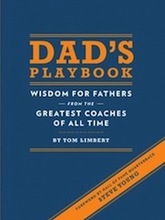 By Tom Limbert
By Tom Limbert So you’ve got yourself a little toddler there – good times. Dana Carvey once quipped “They’re not so bad, just keep M&M’s in your pocket and feed ‘em here and there.” If only it were so easy. What makes them so terrible sometimes? That answer is not as mysterious as it sometimes seems (e.g., in the eye of a tantrum at Target checkout). Think about it – right now while you’re calm and not tantrumming back at them. What are they grappling with that we have learned and hence take for granted? Two things: they don’t know how to communicate yet and they don’t know how to manage the overwhelming emotions they’re experiencing for the first time. Wouldn’t that make you want to freak out?
Well, the next time your toddler does, take solace in the fact that you have choices on how to react. What’s more, if you make the “right” choices, they’re gonna’ freak out less and less. I’m going to elaborate but first, allow me to establish some irrefutable truths of human nature – truths that will light your way in your quest to curb your toddler’s unruly behavior and hence bring you more peace and quiet.
Well, the next time your toddler does, take solace in the fact that you have choices on how to react. What’s more, if you make the “right” choices, they’re gonna’ freak out less and less. I’m going to elaborate but first, allow me to establish some irrefutable truths of human nature – truths that will light your way in your quest to curb your toddler’s unruly behavior and hence bring you more peace and quiet.
- Human beings wish to be treated with respect. It’s innate and it’s evident as early as one year. If you want your child to heed your guidance, you will want to treat him with respect.
- Children don’t naturally want to “misbehave.” Sure they’re wired to test a bit, but if they do it repeatedly it’s because they have been conditioned to or have not been taught how else to behave.
- The word “discipline” has a latin meaning of “instruction, knowledge.” “Disciple” means “learner.” (please note the absence of the terms “training” or “punishment.”)
- Young children learn best by modeling behavior.
- “Anger is the enemy of instruction.” OK, it’s a quote from eleven-time NBA championship coach Phil Jackson, but I’m putting it here in the irrefutable truths section. Think about it. Frustration and anger just distract humans from attaining messages.
- Do Accept – You want to meet the situation with an understanding that your child has not learned how to communicate or react yet and is behaving perfectly natural (albeit annoying). If you meet your child with a sense of understanding and acceptance, it will color your reaction and make your child more willing to adhere to your advice and support.
- Don’t Get Defeated – Your confidence is key and should be bolstered by the fact that you know these situations are inevitable. Helping your child in these moments is very much part of your role now (albeit annoying). You’ll be much more effective if you can manage to accept this as well as your child’s behavior.
- Do Empathize – This ties into the acceptance piece and the #1 truth above. If you can somehow convey to your child that you genuinely feel for him in these (albeit annoying) moments, it will go a long way towards gaining his cooperation.
- Don’t Exude Frustration – You’re a leader and a teacher. If you get all flustered, you won’t be able to communicate effectively and your child will not only be distracted from your messages – you will ironically be reinforcing the very behavior you wish to curb. (This flows from the truth I didn’t list: It’s fun to watch mom or dad sweat.)
- Do Interpret – Try to decipher what your child is telling you through her behavior. What’s the message here and how did your own behavior or tone influence the scenario? (that part’s not easy)
- Don’t Ignore – There’s a time and place when the best thing to do is simply to ignore a child’s behavior. But it will be both disrespectful and ineffective if you skip all the other steps.
- Do Teach – Once you’ve interpreted, it’s time to impart. You can do this through both your calm words and your actions. What understanding or language is she missing that will help now and next time?
- Don’t Train – Best to stay away from bribes unless you think Dana Carvey was onto something (hint: he’s a comedian). As these little guys get older, you can start to explain the benefits associated with making the right choices. Calmly remind them what’s in it for them – much more effective long term than bribes and threats.
- Do Redirect – For these young ones, especially when they’re all fired-up, you don’t want to get caught lecturing – keep it brief and then move the attention to the next activity. Sell it a bit. If you can somehow tie that activity towards what she wanted in the first place, but in a more acceptable manner, all the better. You’ll be showing your child that you respect her (that makes humans more willing to listen).
- Don’t Punish – If you in fact accept all five truths above – especially #2 (I like making you read them again)– then it follows that punishing young children is futile. Just ask yourself: Do I want to teach my child that when he gets frustrated and tests limits he will be punished, or teach him that there are alternatives to his behavior, he can make better choices, it will benefit him in the end, and I am here to help him learn all that?
- Do Disengage from Conflict – There will no doubt be times when you have done all you can and your child is still not having any of it. We’ve all had moments where everyone lost their cool. We all know what good that did us. Disengage and their tantrums will lose power and eventually cease.
- Don’t Engage in Conflict – Getting worked up? They already know our buttons. Just respectfully and calmly tell your child YOU need to calm down and walk away from the battle. Stick to whatever lesson you were teaching and tell him you’re ready to help him more when you both calm down; balance empathy with calm, confident consistency.
See more of Tom's articles at ParentCoachTom.com




 RSS Feed
RSS Feed